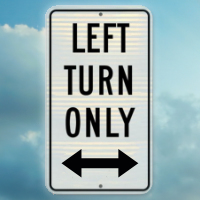 Nothing spatial is intuitive for me. Up or down, above or below are clear. But when I encounter left or right, clockwise or counter-clockwise, east or west — I have to put intense effort into matching the word with a direction.
Nothing spatial is intuitive for me. Up or down, above or below are clear. But when I encounter left or right, clockwise or counter-clockwise, east or west — I have to put intense effort into matching the word with a direction.
I dealt with this spatial idiocy for many years by flapping my hand, using the kinetic energy to help my brain connect the direction with the word. When driving and someone would say “Turn left!” I would flap my left hand for a second or two until my brain got the hint. Or, to be more accurate: I’d flap what I thought was my left hand, and hopefully if I’d gotten it wrong someone in the car would correct me before I’d actually made the wrong turn. Which didn’t always happen.
Or I’d be talking with someone and I’d say,”So when you get to the plaza, you’ll need to look to your [pause while I flap my right hand] right…”
My flap-dependent way of discerning left from right could sometimes be embarrassing. Such as when running a meeting during a web development project and multiple times having to say “in the upper right” or “in the left nav,” flapping for a live audience!
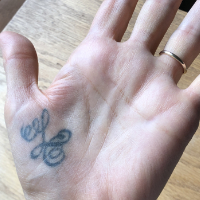 Finally, after flapping for most of my life, I’d had enough! In the early 2000s I marched myself into a tattoo parlor and had a beautiful, extra-scripty “L” tattooed on my left palm. I had to contact several tattoo artists before finding one who would do the job, as palm tattoos are especially tough to do with good results. I’d asked for it to be in the center of my palm, but the inker said we needed to compromise.
Finally, after flapping for most of my life, I’d had enough! In the early 2000s I marched myself into a tattoo parlor and had a beautiful, extra-scripty “L” tattooed on my left palm. I had to contact several tattoo artists before finding one who would do the job, as palm tattoos are especially tough to do with good results. I’d asked for it to be in the center of my palm, but the inker said we needed to compromise.
And yes: it was extremely painful.
It took a while to kick the flap-habit, but now when I am faced with the words left or right, or if I know the direction I want but need a word for it, I hold up a palm and look for the L (or the absence of it). Not only do I no longer need to flap, I now have a guarantee of getting the correct answer every time!
It’s also about time, and…
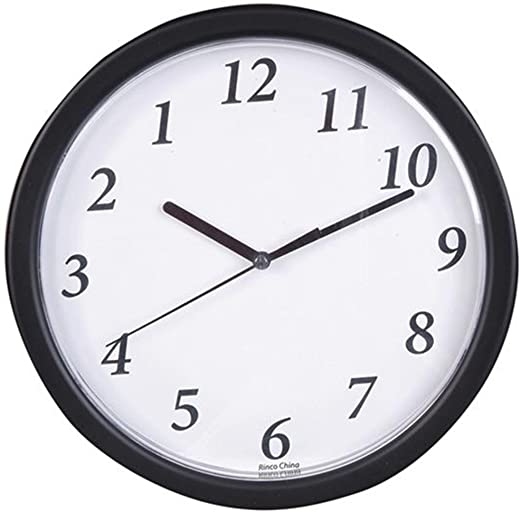 But my spatial idiocy doesn’t just apply to direction in space. This direction/spatial confusion extends to anything that requires going in a specific direction. Including calendars, clocks, math, and more.
But my spatial idiocy doesn’t just apply to direction in space. This direction/spatial confusion extends to anything that requires going in a specific direction. Including calendars, clocks, math, and more.
In general I’m okay with time: I can read a clock just fine, thank you very much. But calculations with dates and times don’t have to get too complex to throw me. “What time will it be nine hours from now in this other time zone,” is something that I’ll need to figure out in writing, possibly with diagrams.
I recently had to set up an eight-week meeting schedule with alternating start times spanning five different time zones from Portland to Seoul. I spent well over an hour carefully diagramming everything to make sure I got it right, set everything up in the meeting tool, then transcribed it all into text that I could send to the meeting attendees.
I still got it wrong… but I didn’t realize it until after I’d emailed the schedule to a huge mailing list. It was a discouraging mess.
 Here’s another case: I am a knitter. Every knitter has patterns and diagrams on how to do stitches, but even about ten years into this, I still must frequently consult my notes on when the yarn should be in the front or back, which direction to wrap yarn around the needles, and how to tell if a stitch is backward. On the left needle, the rightmost leg of the stitch should be to the front. Easy, right?*
Here’s another case: I am a knitter. Every knitter has patterns and diagrams on how to do stitches, but even about ten years into this, I still must frequently consult my notes on when the yarn should be in the front or back, which direction to wrap yarn around the needles, and how to tell if a stitch is backward. On the left needle, the rightmost leg of the stitch should be to the front. Easy, right?*
But perhaps the most impactful example of my directional issue being a problem is math. Adding, subtracting, and multiplying are fine, but once I get to division I can’t seem to intuit which number is going into what. To say I have math anxiety is an understatement, especially when I must grab a calculator during a meeting for what everyone else in the room would consider a simple problem.
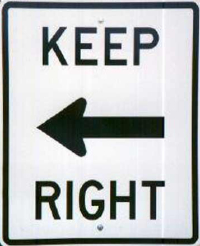 I do not have dyslexia or dysgraphia: my reading and writing are fine. I can effortlessly, intuitively tell which way letters go when they are in their proper context of words and sentences. But if I see letters and numbers out of context, especially if I am stressed or tired, I can easily get confused.
I do not have dyslexia or dysgraphia: my reading and writing are fine. I can effortlessly, intuitively tell which way letters go when they are in their proper context of words and sentences. But if I see letters and numbers out of context, especially if I am stressed or tired, I can easily get confused.
Is that E or L backwards? Let me put it into a word… Okay, I see which way it goes now.
This is why I find it extremely annoying when someone says: “It’s easy to know your right from your left: Just use your index finger and thumb to make an L, and that one is your left!” Oh yeah? Well, I can make a pretty convincing L with either hand, because out of the context of a word, I don’t intuit which one is backwards!

So what’s it all about?
I copied (and then edited) the below from this StackExchange page. I normally would have just linked to the page, but there is also some incorrect information there that I don’t want to link to.
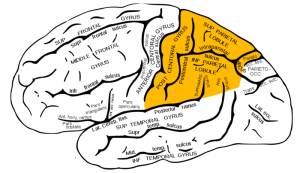 Neuroscientists call this phenomenon left-right confusion (or right-left confusion/disorientation), and there are several theories for what causes it.
Neuroscientists call this phenomenon left-right confusion (or right-left confusion/disorientation), and there are several theories for what causes it.
The brain region called the left parietal lobe is responsible for spatial sense and navigation (proprioception) and sense of touch (somatosensation). It is said that if you are one of the 20% of people who has a problem detecting left from right, you may very well have other problems associated with the left parietal lobe.
Although not definitive, executive director of the Handedness Research Institute, M.K. Holder, believes the problem resides in the degree to which brain function is “lateralized,” or divided between hemispheres. Men and right-handed people tend to be more strongly lateralized, thus women and left-handed people are more likely to have this peculiarity. To put it simply, the more “biased” the brain is toward one hemisphere over the other, the more likely there is to be left-right confusion.
Another intriguing theory suggests that left/right confusion may be tied to your personality type. Phillippe De Sainte Maresville, a Jungian expert with a left/right problem, believes people that combine the (S)ensing method of gathering information and the (F)eeling process of decision making are more prone to this problem of left-right confusion.2
Sources:
* Knitting photo from stitchandstory.us
1. “Left or Right? Why Some Smart People Confuse Them” By Erin Froehlich [smartlivingnetwork]
2. “Can’t tell your left from your right? You needn’t worry about it” By Susan Perry [minnpost]
3. Perietal lobe [wikipedia]